
Unclaimed Money Lookup - Rhode Island
Free Rhode Island Unclaimed Money Lookup
We receive referral fees from partners (advertising disclosure)
The information we provide you is free of charge and a result of extensive research by our home warranty experts. We use affiliate links on our site that provide us with referral commissions. While this fact may not influence the information we provide, it may affect the positioning of this information.
(advertising disclosure)
The information we provide you is free of charge and a result of extensive research by our home warranty experts. We use affiliate links on our site that provide us with referral commissions. While this fact may not influence the information we provide, it may affect the positioning of this information.

Rhode Island Unclaimed Money -
The Ultimate Guide 2025
- UPDATED May 2025
Learn what the Ocean State does with unclaimed property and how to claim yours in our ultimate guide to Rhode Island.
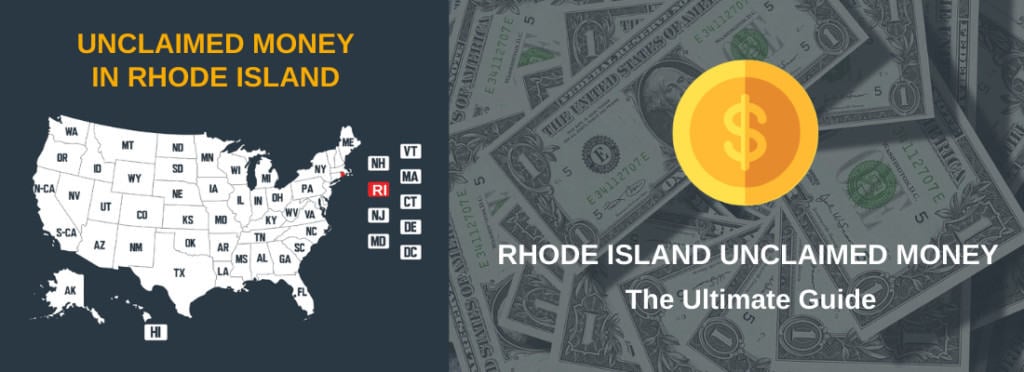
Contents
- Your Ultimate Guide to Rhode Island Unclaimed Assets
- What is Unclaimed Property?
- How Much Unclaimed Property Does Rhode Island Have?
- How to Find Unclaimed Money in Rhode Island
- Steps to Get Your Unclaimed Property
- Who Can Claim Property in Rhode Island?
- Are There Other State and Federal Databases Worth Trying?
- Unclaimed Property Laws in Rhode Island

Your Ultimate Guide to Rhode Island Unclaimed Assets
Find RI Money is a website designed by the Rhode Island Treasurer with help from the Unclaimed Property Division that helps owners find any of the assets that they lost over the years. Visiting this site lets you search the database to find property that you owned and lost. Not only can you find checks that you didn’t get or cash, but you might find assets that banks and other organizations held in your name such as a refund on your electric bill or a checking account.
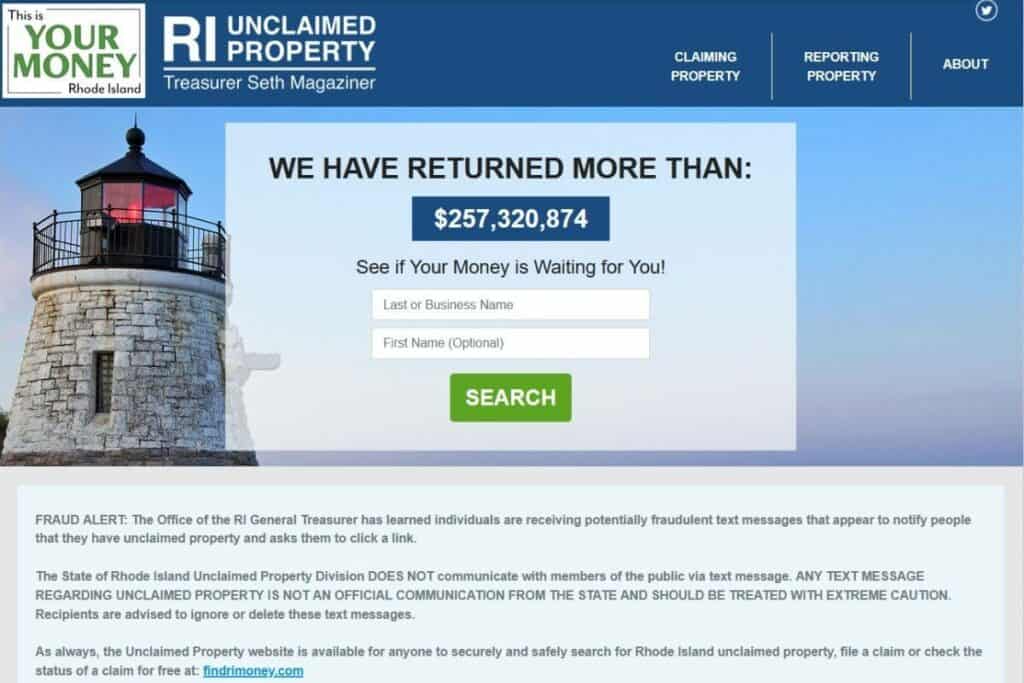
One of the nice things about this database is that the Ocean State updates it regularly. While you may not find anything the first time that you search, you may come across two or more assets on your next search. We created our ultimate guide to unclaimed money in Rhode Island to show you how easily you can find abandoned assets. You can follow along with the steps that we list to search the system and get your money before checking out all the other great resources that we found. Whether you live in Providence, Newport, Warwick, Middletown or any other city, you can find your unclaimed money.
What is Unclaimed Property?
Though Rhode Island does not consider vehicles or real estate as a type of unclaimed property, it uses this term to describe any other assets that list one or more owners who do not claim it. Organizations function as holders who oversee the property and keep it safe. They keep track of the interactions that they have with owners, which can include making a deposit, sending a letter or logging into an online account. Most holders only require that owners are active at least once a year to keep their accounts in good standing. They will notify the treasurer when the owner ceases any type of activity and mark the asset as abandoned.
Unpaid wages are just one example of the unclaimed property found in Rhode Island. Federal law requires that employers pay employees all the wages due to them. Not only does this include the hours that you worked, but it also includes any money that you paid out of pocket that the employer promised to reimburse and any paid time off that is due to you. Rhode Island may list checks that include commissions or bonuses that you earned at a past job, too.
The Rhode Island system keeps track of uncashed checks as well. This includes more than just the checks that you get from your previous employers. Have you ever put down a deposit on a rental home or apartment and moved before the landlord gave you back your deposit? While your landlord can take some money to pay for any damage that you did, state law requires that they send you a notice that details what they did with your deposit and how much you will get back. You can also use the Ocean State database to find uncashed refund checks from some of your favorite stores along with your utility companies.
Rhode Island also has hundreds of abandoned bank accounts listed online. Do you remember what happened to your first bank account?
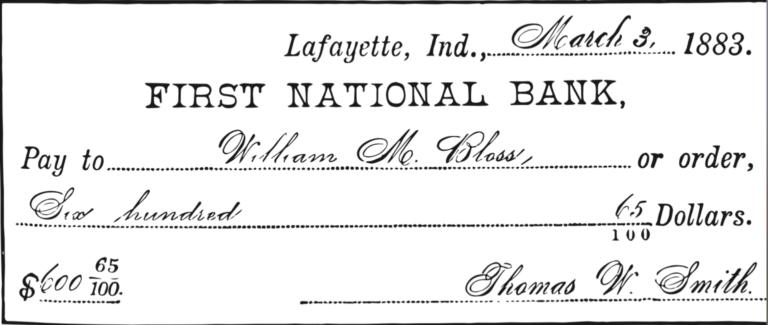
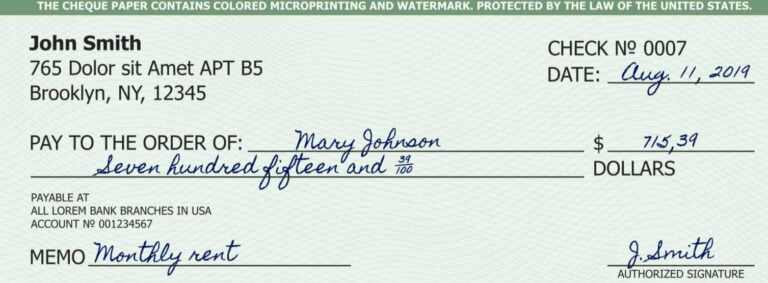
Many people open accounts with help from their parents and later open a separate account. You may not realize that your parents never closed the first account and that the bank left it open for a year or longer. Rhode Island allows you to claim the account and get a check for the balance that you had with the bank along with the interest that your money earned. Banks report both checking and savings accounts that show no activity on the part of their owners. You may find quite a bit of money spread across multiple assets that belong to you in the Rhode Island database.
How Much Unclaimed Property Does Rhode Island Have?
The Rhode Island Treasurer claims that those in the Ocean State got back more than $257 million since the website launched. Even with that money removed, the state still oversees more than $300 million in unclaimed assets. There are also more than 300,000 assets listed in the database. In addition to the money held by Rhode Island, other states have similar databases that you can search. You may want to look for the more than $42 billion in funds held by government agencies and other organizations, too.
How to Find Unclaimed Money in Rhode Island
Finding unclaimed money and other assets in Rhode Island is easier than you might expect. You just need to start at the website of the Rhode Island Treasurer.
Step 1: Visit the Find RI Money website designed by the Rhode Island Treasurer and Unclaimed Property Division.

Step 2: Look over the information available on the site to find out more about claiming Rhode Island property. You will then scroll to the bottom of the site to locate the “Claiming a Property” search box. Rhode Island asks for just your last name but will accept any other information that you have such as your first name, the claim ID or the zip code or city name where you live/lived.
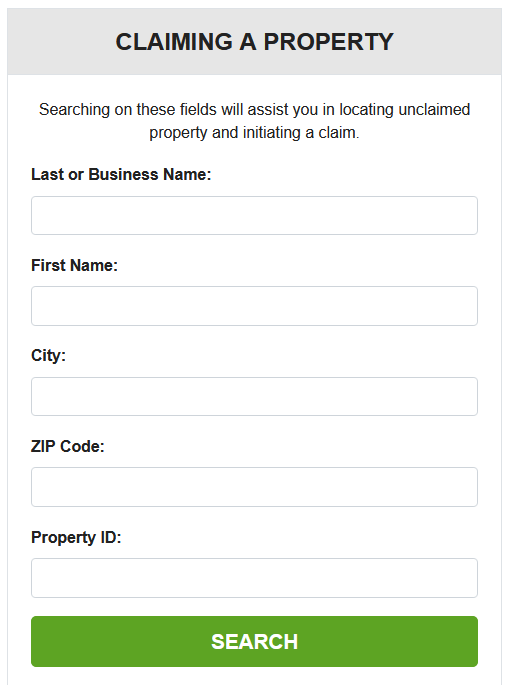
Step 3: Check the assets that Rhode Island found to claim your property. Though you can claim more than one per search, you need to make sure that you are either the owner or have a legal right to claim the asset for another reason. Rhode Island lists assets with a value of up to $50 or $50-100 as well as those worth $100 or more. You can also see the holder’s name to find out who informed the treasurer about the asset.
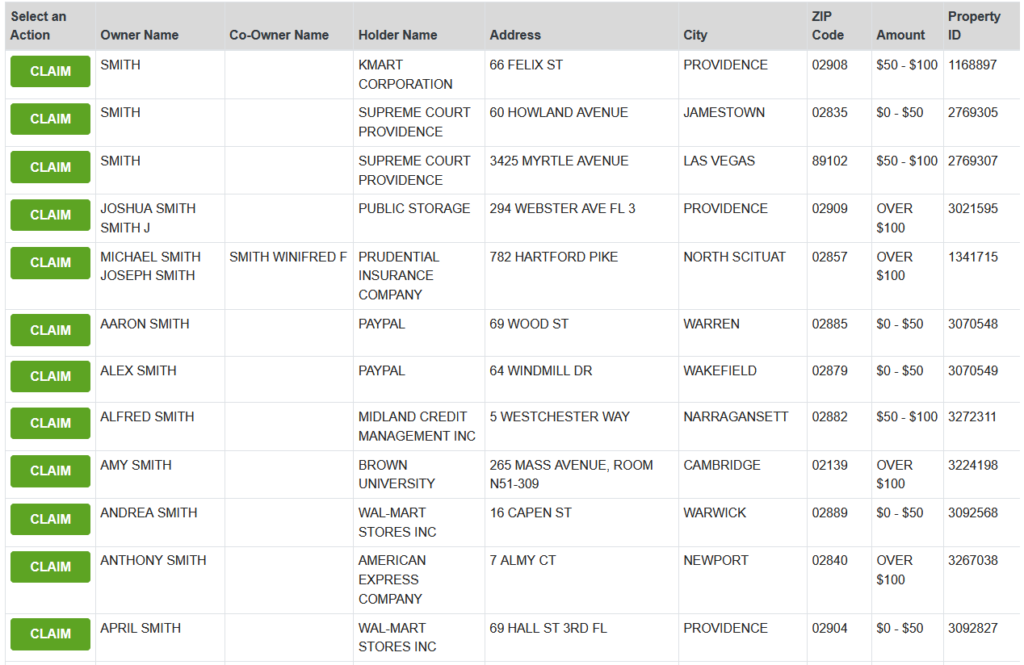
Step 4: Find the green “Claim” button and click on it when you find the right asset. You can click it a second time to remove the asset from your account. No matter how many assets you want to claim, only click on the final “Claim” button when you’re ready to file. Rhode Island will show you how many assets are in your cart.

Steps to Get Your Unclaimed Property
Once you stake a claim on a piece of property, you’ll reach a page that looks similar to the one below. You need to go through a few steps to claim your asset and get the money.
Step 1: Click on the “Claimant Relationship” menu to state how you want to claim your property. The option that you choose determines what information the state requires from you.

Step 2: Verify that you picked the right filing option and confirm that you can file in that way. You need to click on the “Next” button at the top of the page.

Step 3: Share your information on the next page to make sure that Rhode Island can contact you as needed. Pay attention to the marked boxes, which are required. Click on the “Next” button to continue.
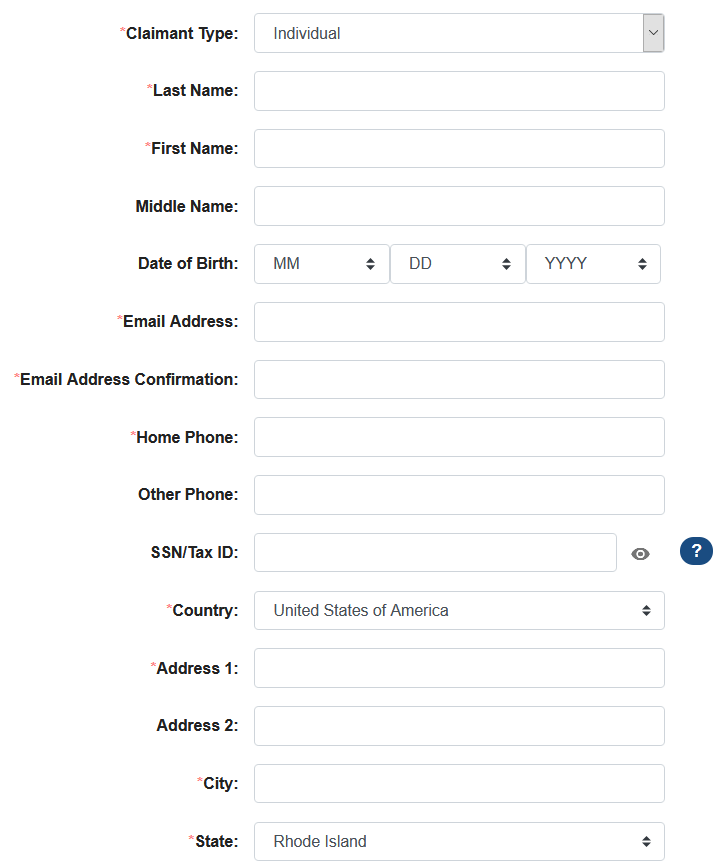
Step 4: Click the box on the electronic signature page and type your name in both of the boxes shown. This confirms that you are who you say you are and that all the information you listed is correct. When you click the green “Submit” button, the form will go to the Rhode Island Treasurer.

Step 5: Check your email for a copy of your claim, which will also list any documents that you need to submit. Visit the Rhode Island document upload page to share those documents.
Step 6: Read through the information at the top of the page to see the type of documents that you can submit. You also need to click on the box next to this section.
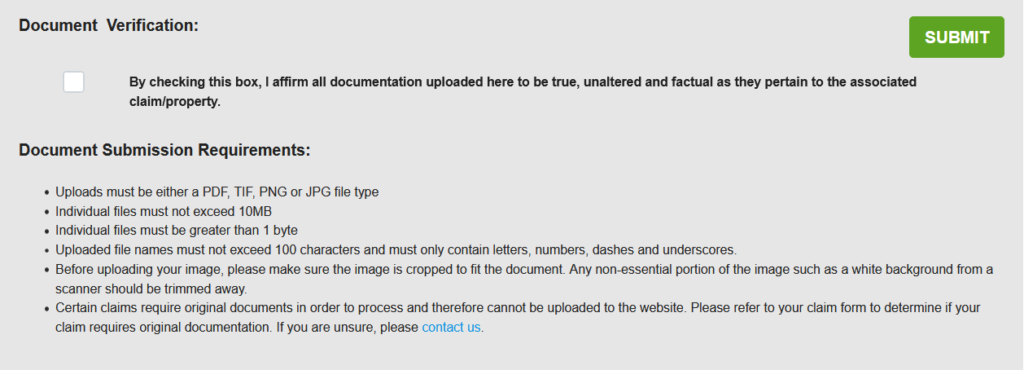
Step 7: Find the claim number on your form and type it into the box on this page. You also need to add the email address that you used to file. The site asks you to click on the “Add Document” button to find the right document on your computer to upload it. Once you finish adding all of your documents, click on the green “Submit” button.
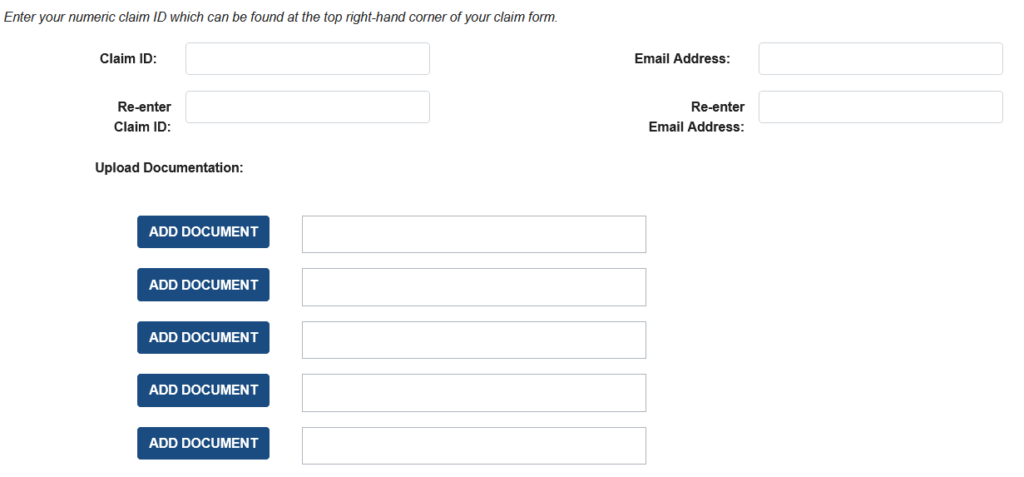
Who Can Claim Property in Rhode Island?
In addition to the property owners, Rhode Island will accept claims from three different types of heirs. The first is an heir of a small estate. When someone dies with a small estate that has a total value of $15,000 or less, you have the legal right to claim their property as their sole heir or one of several heirs without going through probate. If the estate has a minimum value of $15,000, you need to open a probate case. This allows you to file as a legal beneficiary while the estate is still open. There is a third option designed for heirs filing on behalf of a closed estate.
Rhode Island also accepts claims filed with the power of attorney paperwork. This paperwork shows that you have the legal right to assist someone with their overall needs. You may need to claim a property to pay for the person’s home health care. If you are a trustee with official paperwork that shows you are an owner of a business or trust, you can also file. Rhode Island allows the owners of open and closed companies to file property claims, too.

Are There Other State and Federal Databases Worth Trying?
Yes, there are a number of other databases that you can use to find unclaimed property. You might try the resources offered by the Internal Revenue Service (IRS) as anyone who lives and makes money in the United States must file taxes. The IRS makes it easy for you to find a refund check sent to the wrong address and change your information to update it. You can also work with the IRS to set up direct deposit into your current account if you have one.
The Department of Housing and Urban Development (HUD) strives to help people afford homes and get mortgages. You might ask for help when you can’t make your loan payments, too. HUD can help you work with your lender and avoid foreclosure. The website offers a lot of information on current scams that target those in need. You can also contact HUD to find out if you earned a mortgage refund check that you didn’t get.
Did you ever have a bank account that you forgot about until the bank closed? Thanks to the Federal Deposit Insurance Corporation, you have the right to both track down your old account and claim the money that the bank held for you. Even if the bank merged with another institution, you still have the right to your money. A similar resource is the National Credit Union Administration, which records all the information relating to credit unions that are no longer in business.
While treasury bonds are a good investment for young children, not all of those who receive bonds cash them. The U.S. Federal Investments maintains a website with information on how you can file for your bonds, even if you no longer have the original paperwork. Another government resource that offers help for those in need is the Department of Veterans Affairs. Not only can you find out if you qualify for benefits due to your parent’s service, but you can see if they named you a beneficiary on a life insurance policy.
We also recommend checking with the Pension Benefit Guaranty Corporation and the U.S. Railroad Retirement Board for retirement accounts and other investments. You may want to claim a retirement account owned by a railroad worker in your family after they pass away and find out if the account is still active. Through the Pension Benefit Guaranty Corporation, you can find existing pensions that belong to anyone up to decades after they pass away.
You may want to use the Missing Money, too. This is a nice option for those who lived in more than one state. It provides information on abandoned assets in dozens of states as well as many parts of Canada. Though you may find that the state simply helps you fill out a form to send to the state, it can also process claims for you to help you get your assets faster.
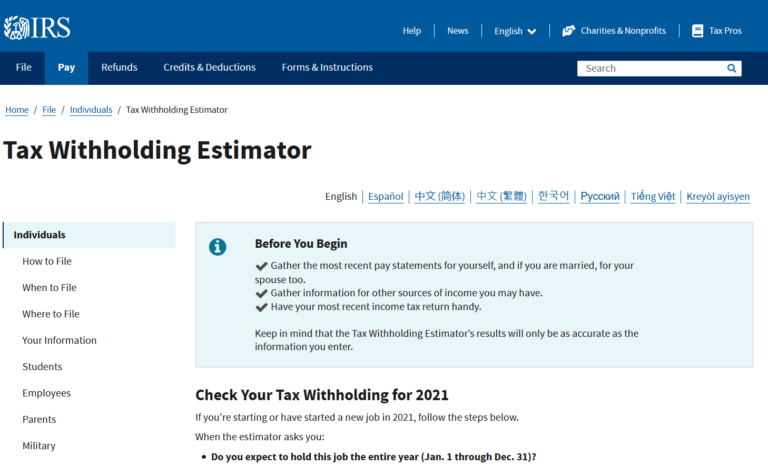
Unclaimed Property Laws in Rhode Island
Rhode Island has many laws relating to both holders and owners of unclaimed property in the state. You can read through the laws online to find out what you need to know. We recommend that you look at how long holders must keep the property. This can range from one year up to five years or longer.
Rhode Island Unclaimed Money FAQs
Why Does the Claim Show Less Than it Should?
When you claim an abandoned asset in Rhode Island, the site will only show you a general amount. You won’t see the full amount until you get the official claim form from the state. In some cases, you may notice that the asset is worth less than you thought. This often occurs because the Ocean State allows holders to take some money from the asset. Take for example a bank that held a safe deposit box. The bank can take money to cover your overdue rental payments. Rhode Island also allows holders to keep any property with a value of $50 or less.
How Long Does It Take to Get Money from Rhode Island?
Rhode Island may take eight weeks or longer to return an unclaimed asset to you. The countdown begins as soon as the treasurer receives your claim form along with your required documents. If you do not upload all the documents that you need, the state will either send a letter to your home or an email that lists what you need to do. Before you start checking the mailbox daily, visit the Rhode Island claim checker. As long as you have the property ID number from your original form, you can search the system and view your status.
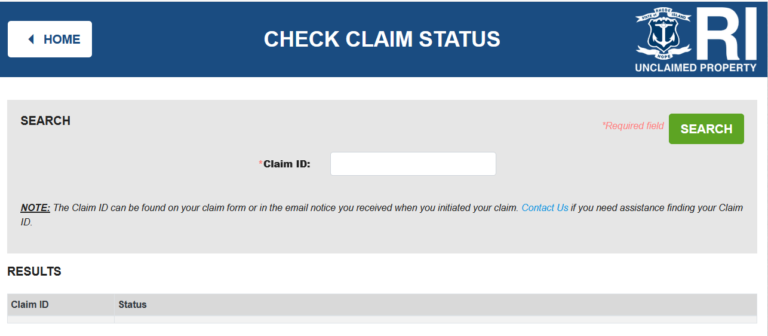
What Does Rhode Island Do with Unclaimed Safe Deposit Boxes?
The Rhode Island Treasurer’s Department is responsible for both keeping track of valuables and returning them to their rightful owners. When holders have no contact with the renters of safe deposit boxes, they can contact the treasurer after three years. The treasurer will then request a full inventory and move all valuables to the vault. Every few years, the state will hold an auction to get rid of the oldest items turned over to make room for more things. Though the state formerly sold those items on eBay, it now holds auctions at different offices across the Ocean State. When you claim your valuables quickly, you reduce the risk that the treasurer may sell them.
How Does the "Your Money" Program Work?
As a way to cut down on paperwork and help more people, Rhode Island launched the Your Money program. The Treasurer’s Office hires workers to search through state and federal databases. They look for people who have unclaimed property in the database and match them with that property based on information such as their social security numbers and names. If they find a match, they will issue a check and send it to the owner’s current address. You do not need to do anything to take part in the program. As long as you live in Rhode Island and have unclaimed property, you might get a check in the mail. It can take years for the state to reunite you with your money though, which is why it’s helpful to search the database instead of waiting for a check.
Do You Need a Heir Finder?
You might feel tempted to use an heir finder in Rhode Island until you look into the process and see how quickly it works. An heir finder charges you money to find your money and may not want to work with you if they don’t think your property is worth much. The Rhode Island Treasurer’s Office claims that it does not work with heir finders and will only send information to the owners of unclaimed property and any heirs that they have. If you attempt to fill out the claim form without being one of the allowed users, the state will not let you claim the property.

Tips to Keep Your Rhode Island Property from Becoming Abandoned
- Use the change of address form available at the post office to make sure that you get your mail when you move. You can use this form if you move to a different part of Rhode Island or across the country.
- Make small transactions every six to 12 months on the accounts that you don’t use daily. You can take money out from a local ATM or check on the beneficiary you named on your life insurance policy.
- Contact the human resources department if you change jobs. This lets you make sure that they have your new address and can send your final paycheck.
- Make it a point to visit the website of any account attached to your bank or home address at least once a year. This shows the holder that you’re still alive and in contact with them.
Conclusion
While it can take a few months after you file a claim before Rhode Island sends you a check, you get the money back that you lost. You might use the money and treat yourself to a new television or pay off an old credit card. Use our guide to quickly file claims for all the property held by the Ocean State for you.
Quickly Search For Unclaimed Money
Disclaimer: OurPublicRecords mission is to give people easy and affordable access to public record information, but OurPublicRecords does not provide private investigator services or consumer reports, and is not a consumer reporting agency per the Fair Credit Reporting Act. You may not use our site or service or the information provided to make decisions about employment, admission, consumer credit, insurance, tenant screening, or any other purpose that would require FCRA compliance.